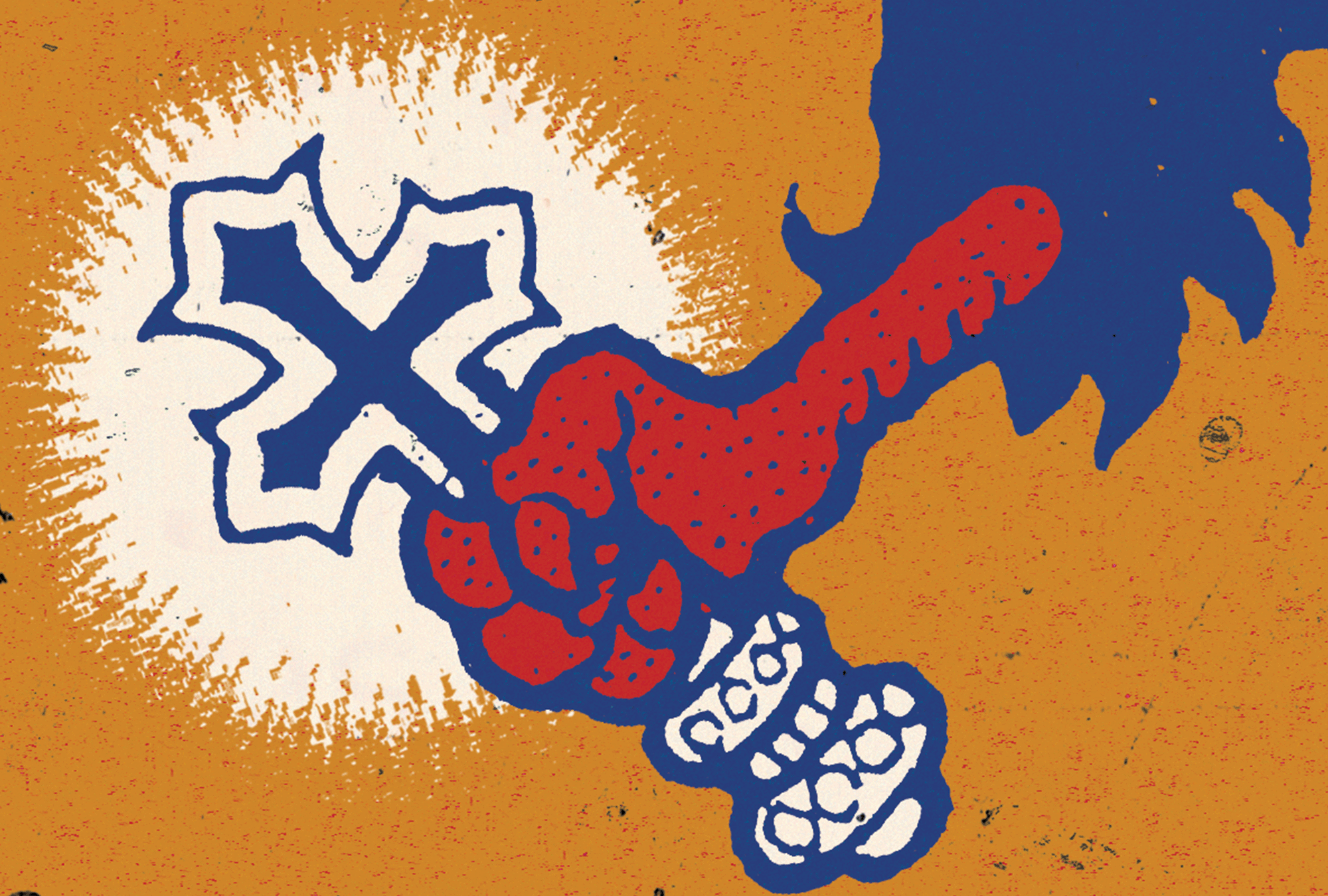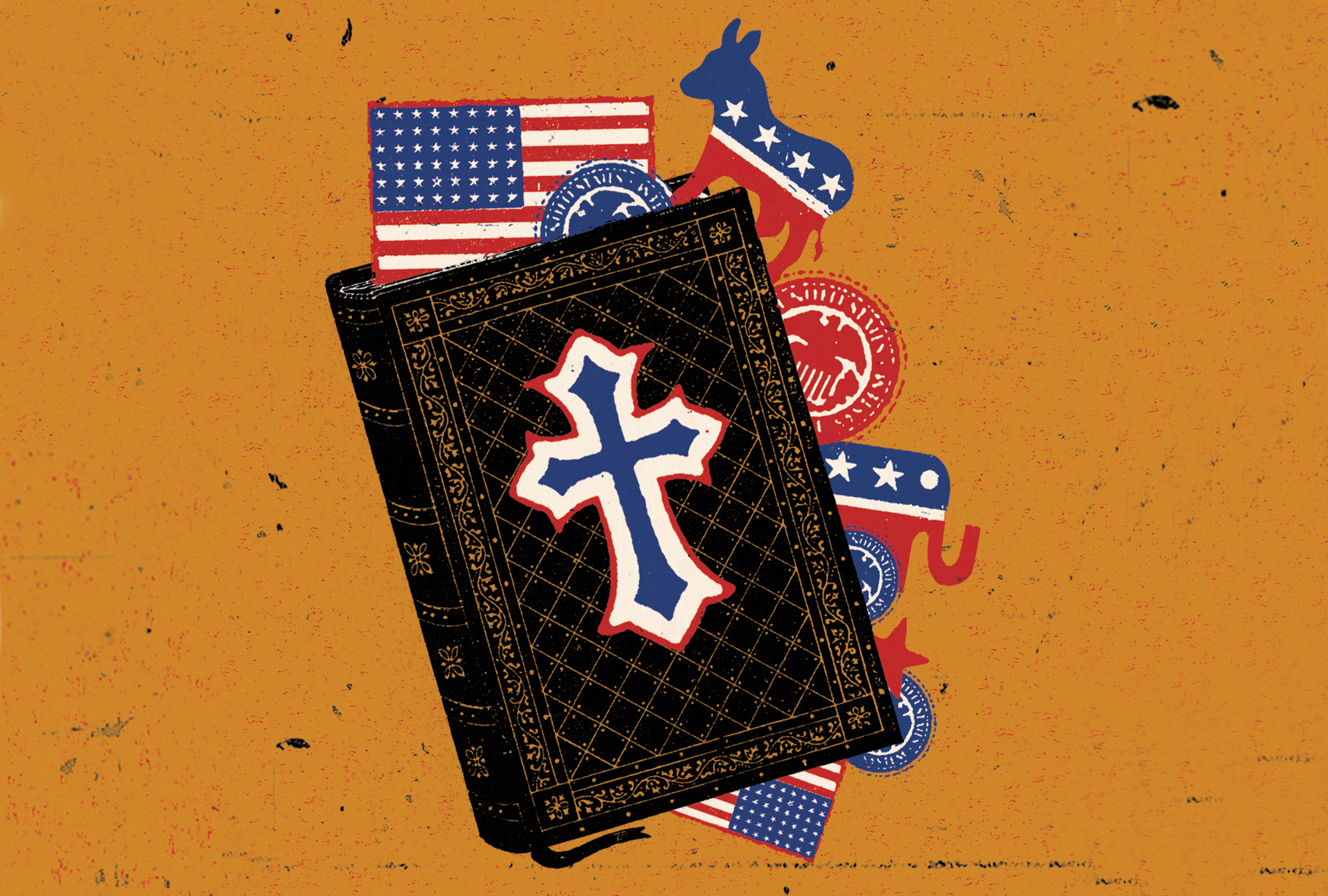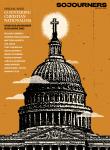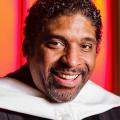"christian" nationalism, an organized attack on the Christianity of Jesus Christ by radical right-wing neo-nazi, fascist extremest, followers of the apostates preaching greed, hate, violence, bigotry, misogyny, tennents of the alt "jesus" they lure Christians to follow through lies, deception, and fear filled propaganda campaigns. Their perversion of Christianity is the main reason so many have left the faith and why so many do not identify as Christian but as atheist, agnostic or just spiritual. The "christian' nationalist drumpf / trump-vance campaign with the "christian" nationalist heritage foundation's project 2025 and the "christian" nationalist gop / greed over people republican party must be defeated not only in the presidential / vice presidential election by voting for HARRIS-WALZ on Tuesday, 5 November 2024. To defeat "christian" nationalism and protect and maintain our democratic Republic we need to elect as many Democratic politicians to Congressional Senate and Representative, state and local office on Tuesday, 5 November 2024. It seems Saint Paul warned us about donald drumpf / trump,
This from the September / October issue of Sojourners magazine
How Christians Can Counter Christian Nationalism
Scholars, pastors, and activists on hopeful action to undo this heretical belief system.
By
WEAPONIZED CHRISTIAN NATIONALISM seeks a “Christian” government that would erode civil rights and undercut election integrity and democratic principles. It endorses the use of violence to obtain or maintain power; embraces white supremacy; and distorts Christian language, symbols, and identity into tools for political manipulation and gain.
At the same time, beliefs about “God and country” exist on a wide spectrum. White Christian nationalism is sometimes supported by people who are not white. And stifling all participation by people of faith in public life is not a suitable alternative to nationalism.
In other words: It’s complicated. You’re not alone if you are confused, concerned, or dismayed by these topics. But hopeful action is possible. The following short essays by scholars, pastors, and activists offer insights on Christian nationalism and how to dismantle it. For a list of additional resources and effective actions for Christians to support democracy, go to sojo.net/steps-to-democracy. —The Editors
Prophetic Faith
IF FAITH WERE not powerful, people in power would not invest so much to manipulate it for their own interests. When we oppose Christian nationalism, we must begin with a recognition of the power of faith.
Faith has the power to bring us together and build up a democracy where everyone can thrive. Every movement toward a more perfect union in our nation’s past has been powered and sustained by deep faith traditions. We need to learn from the faith of Frederick Douglass, Sojourner Truth, and William Lloyd Garrison; Martin Luther King Jr., Dorothy Day, and Ella Baker. This rich theological heritage helps us guard against the forces that distort Christianity to justify extremism. But it also prepares us to practice prophetic faith in our own lives and ministries.
“Woe unto you who legislate evil and rob the poor of their right,” the prophet Isaiah declares. In his first sermon, recorded in Luke 4, Jesus takes up Isaiah’s scroll to proclaim “good news to the poor.” Any alternative to the religious nationalism that calls itself “Christian” must embody this prophetic proclamation for the 135 million Americans who are poor or low-income today. As the divide between the super-rich and the poor has grown wider in the U.S. over the past half century, poor communities have been offered divisive culture wars and the false hope of an individualistic prosperity gospel.
In a time of extreme inequality, Ezekiel says God looked for someone to stand in the gap but found none. Several chapters later, though, God sends Ezekiel to prophesy to a valley of dry bones. There Ezekiel witnesses the power the rejected have when they come together and rise up as a nonviolent army.
Poor people in the United States today are the largest swing vote in national elections. If they unite around an agenda, they have the power to reconstruct American democracy. God has seen fit to ordain those who have been rejected in this world to lead the revival of love, justice, and mercy that we so desperately need. We embody an alternative to religious nationalism when we join God in this work.
The Opposite Of The Gospel
ADHERENTS TO CHRISTIAN nationalism believe they follow Christian principles. In reality, Christian nationalism is anti-Christian, upending biblical principles.
Christian nationalism enacts an insidious form of idolatry. The first commandment of the covenant that Yahweh makes with Israel is “you shall have no other gods before me” (Exodus 20:3). There are countless stories about the disastrous consequences of worshiping anything other than Israel’s God. The biblical witness implores the people of God to not prioritize anything over the worship of their God. Christian nationalism, in practice, does just the opposite.
More than that, the principles that Christian nationalism prioritizes over the worship of God — white supremacy, authoritarianism, the pursuit of power and dominance, and the violence of militarism — directly oppose the teachings and ministry of Jesus.
In his life, Jesus protected the marginalized and vulnerable (women, the poor, the infirmed, the outcast) while pushing against political and religious powers that perpetuated systems of dominance and abuse. In his death, Jesus submitted to those forces of empire to stand in solidarity with those who suffered under their rule. His resurrection solidified the truth of his teaching, that God’s power and kin-dom is a life-giving, peace-bringing reign that turns empire on its head. Together, Jesus’ life, death, and resurrection model for Christians how we should live, that we must oppose the death-dealing powers that cause suffering in the world.
“Christian” nationalism, in contrast, aligns with those powers and results not in the defense of the most vulnerable people, but in their dehumanization. Nothing could be further from the teachings of the Bible and Jesus’ ministry.

Illustrations by Ben Jones
Nationalist Delusions
IN NOTES ON NATIONALISM, George Orwell wrote: “Nationalism is power hunger tempered by self-deception.” Nationalism is a form of ideological capture similar to other “isms” that sacrifice reality for simplicity and a false sense of control. Christian nationalism is one species of nationalism. As such, it pursues power tempered by delusions.
Christian nationalists seek the power to govern the United States on their own terms. Believing that America has drifted from its Christian origins and values, Christian nationalists believe they must guide the nation back to the right course. Guided by a selection of biblical maxims and Christian values, Christian nationalists believe they can ensure a strong nation for future generations. Seeking the power to govern becomes altruistic.
Christian nationalism’s delusions inform its interest in power, implying that a certain standard of morality will guarantee America’s future. There is little biblical reason to think that a minimal standard of morality will sustain our nation. The biblical text suggests that God limits the duration of nations (Acts 17:26) and will only allow a certain amount of “iniquity” (Genesis 15:16).
Second, it implies that ongoing legislation and enforcement will keep human sin in check. As I wrote in Serpents and Doves, “If Israel could not overcome human sin despite its unique, God-given advantages, why is it that we think a Christianized version of the United States can?” Law and order are not trivial, but they are limited. Christian nationalism overestimates the state’s potential.
There are other Christian nationalist delusions, but it seems important to end with a positive theological account of Christian politics. Our call is to follow Christ even if the world never changes. Christians may engage politically so long as doing so does not diminish our capacity to point to and glorify the Triune God. To do so, we remember that Christians are not responsible for fixing the world, but for living faithfully in a world so broken only God can fix it. Christians do not pursue political power but patience as we wait for God to make all things new (Revelation 21:5).
Antithetical To Love
INSTEAD OF CHRISTIAN nationalism, I want people to love their neighbors.
Christian nationalism is, at its core, a pursuit of control — of people, of land, of resources, of ideas, of speech — amid a perceived moment of chaos. Rather than seeing control as something we wield only in service to a greater good, Christian nationalists enjoy control for its own sake. It is, as St. Augustine describes, like an exiled community journeying home who, along the way, become so enthralled with the ships and carts transporting them that they forget why they embarked on this homebound journey in the first place. Christians who are infatuated with control will always lose sight of what God calls us to enjoy: God and neighbor.
If Jesus’ life and ministry teach us anything, it is that this control is not only antithetical to love, but it also actively works against love. The determinative control that Christian nationalists seek to wield is the very control that God gives up. God does not force our hand but instead beckons us to love and enjoy God because of God’s good and loving action toward us. God forfeits control by entering the chaotic waves and ripples of our contingency and creaturehood and making Godself known to us in Jesus Christ.
By returning control to its rightful place as something we use rather than enjoy, we are released to the radical, loving possibilities of moving in and through our world recognizing that Jesus is Lord, and we are not. Truly, the possibilities of goodness, flourishing, community, reconciliation, and transformation are not brought about by domination. They are made possible by the divine love of God flowing in and through us as we love a God who has commanded that we love our neighbors.

Illustrations by Ben Jones
You Are Not Alone
ACROSS THE COUNTRY thousands of rural Americans are working to slow the spread of Christian nationalism in our communities, and we are facing overwhelming odds.
Nationally, about 3 in 10 Americans sympathize with Christian nationalism. In rural states such as North Dakota, Mississippi, Alabama, and West Virginia, that number climbs to nearly 5 in 10.
Among my faith community (white evangelical Protestants), the numbers are especially alarming. Thirty-one percent of us support the statement: “Because things have gotten so far off track, true American patriots may have to resort to violence in order to save our country.”
The vocal and visible presence of Christian nationalism in our communities can be overwhelming. Those of us in small towns and rural communities who disagree with Christian nationalist ideas often feel isolated, alone, and afraid. It can be scary to be the only person in your church or community who supports democratic values. But the fact is, you’re not alone. Millions of pro-democratic voters live in small towns and rural communities. We’re just in hiding.
That’s why leaders in our rural network at RuralOrganizing.org are distributing thousands of yard signs that say, “We support choice, freedom, and democracy.” Our research shows that these signs lead to multiple conversations with friends, families, and neighbors about the importance of supporting our democratic institutions.
Putting up a yard sign is a small step, but it’s critical. We can’t address Christian nationalism on our own. It takes an entire community; we can’t build it in the dark. We must show our allies in the shadows that they are not alone. And if we’re going to address the Christian nationalist ascendancy in rural America, it’s easier if we all jump in together.
A Citizen Of Heaven First
IN THE MIDDLE of the night in Iraq, I woke up to my sergeant calling for a medic. I rolled out of bed, grabbing my gun and medic bag. While I was sitting in the tent clinic waiting for my patient to be seen, a soldier leaned over and in a conspiratorial whisper said, “I’m not a conscientious objector, but I love Jesus and there’s no way I would take away another person’s chance at knowing God for eternity. I’m a truck driver, and it’s dangerous out here. I have a wife and kids back home too. But I refuse to load bullets in my weapon.”
His words stung. What am I willing to give my life for? What am I willing to take a life for? My unflinching answer to both of those questions had always been “America.”
Waging war in Iraq forced me to confront that I was trying to serve two masters: Christian nationalism and Christ. Because Jesus requires us to lay down the sword while Christian nationalism calls us to pick it up. Christ commands us to love our enemies while Christian nationalism requires us to conquer them. Christian nationalism divides us from Jesus.
That night I went back to my tent and unloaded the bullets from my gun. With each emptied bullet, I found freedom to give my allegiance to Jesus first and my country second. Obeying Jesus’ command to love my enemies instead of killing them is how I became a citizen of heaven first.
We can’t build a Christian nation marked by God’s mercy, forgiveness, and self-sacrificial love using the tools of death, destruction, and deception.
Waging war cost me everything, but finding my freedom from Christian nationalism is what saved my life on the battlefield of Iraq and will change your life too.

Illustrations by Ben Jones
It's Time To Choose
CHRISTIAN NATIONALISM IS an oxymoron. I know, because I have been a Christian and a nationalist. And I could not do both at the same time.
To be a Christian (aka a Christ follower) means following a leader who never led an army, who never used a weapon, who opened the table to outsiders, and who told us to welcome the stranger (as a way of welcoming Jesus).
To be a nationalist means that you put the nation above all. It is a type of worship of the history and race of one people over others. It’s a faith statement that says, “We are superior AND WE MUST BE PROTECTED.”
To be a proper Christian nationalist you must be bad at Christianity and bad at caring for your country.
It’s time to choose.
When I pastored a church in North Carolina, I tried to start a Spanish-speaking service and declared our space a sanctuary. You know, so that undocumented migrants, who speak Spanish, could come worship Jesus without fear of being chased by ICE. But apparently “protecting” the nation against undocumented mothers, fathers, and children was more important than following Jesus.
Jesus was clear: Welcome the stranger.
Nationalism is clear: Reject the stranger, war with the stranger, destroy the stranger.
Christian nationalism is not a religion or a form of Christianity. It’s a cultural framework that promotes the fusion of Christianity with American civic life— which is impossible when you’re trying to follow Jesus into the margins.
Christian nationalism: Our country is blessed. It’s manifest destiny. Our ways are superior. Our Constitution is divine. God chooses the U.S.
Christ: Love thy neighbor. Serve others. Welcome the stranger. Care for the poor and the sick. Be a peacemaker. For God so loved the world.
Change Is Possible
I WAS IN pastoral ministry for the past 13 years. I saw the toxicity of this Christian nationalist ideology and the way that it was captivating minds and hearts. To me it is a deep distortion of the gospel. As a pastor I felt a great responsibility to develop people and help them understand the ways of Jesus and how that is counter to this ideology.
When we think about addressing Christian nationalism, there are a few approaches. One is trying to develop awareness. Only a small percentage of the population are true champions of Christian nationalism, but many people are adherents or accommodators of some Christian nationalist beliefs. You address awareness through conversations and classes, trying to help change minds and hearts, most likely of those in the accommodator group.
One resource, for people who have no idea about Christian nationalism, is The Flag and the Cross: White Christian Nationalism and the Threat to American Democracy, by Philip S. Gorski and Samuel L. Perry. Another resource for conversations is Pamela Cooper-White’s book The Psychology of Christian Nationalism: Why People Are Drawn In and How to Talk Across the Divide. She writes about three different thresholds: green light conversations, yellow light conversations, and red light conversations. We need to nuance conversations with people depending on where they are in their adoption of this ideology. She gives tools to think through that.
A second way to counter Christian nationalism is addressing the policies it impacts. Our coalition in North Texas has taken this route. We’ve focused on Tarrant County, where Fort Worth is, and Dallas County.
Through lots of conversations, we’ve discerned three focus areas. One is education—fighting for public schools and public-school teachers, specifically countering book bans and vouchers. The second area is immigration, as Christian nationalism influences the anti-immigrant narrative. The third area is church engagement. How do we help churches interrogate their biases around policies and practices that uplift Christian nationalism? We then find a new way forward, helping churches discern a theological framework for political and civic engagement in contrast to Christian nationalism.
There’s so much that we can do to address Christian nationalism. But I often feel we are captivated by hopelessness. Change is possible. If we’re not grounded in our hope of what could be — and what we want to see our world be — then we will be overwhelmed by the waves of issues and policy. I don’t know if we’ll see the end to this in our lifetime, but our future is worth the fight.

Got something to say about what you're reading? We value your feedback!











No comments:
Post a Comment